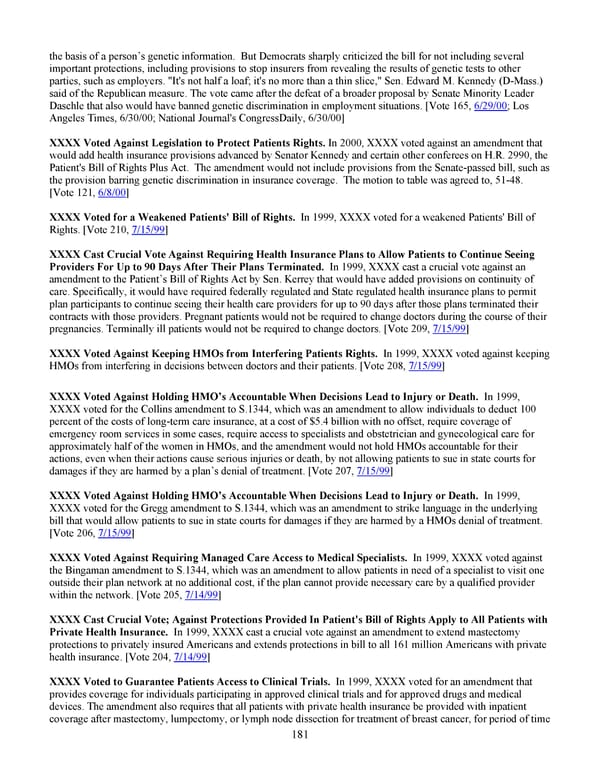the basis of a person’s genetic information. But Democrats sharply criticized the bill for not including several important protections, including provisions to stop insurers from revealing the results of genetic tests to other parties, such as employers. "It's not half a loaf; it's no more than a thin slice," Sen. Edward M. Kennedy (D-Mass.) said of the Republican measure. The vote came after the defeat of a broader proposal by Senate Minority Leader Daschle that also would have banned genetic discrimination in employment situations. [Vote 165, 6/29/00; Los Angeles Times, 6/30/00; National Journal's CongressDaily, 6/30/00] XXXX Voted Against Legislation to Protect Patients Rights. In 2000, XXXX voted against an amendment that would add health insurance provisions advanced by Senator Kennedy and certain other conferees on H.R. 2990, the Patient's Bill of Rights Plus Act. The amendment would not include provisions from the Senate-passed bill, such as the provision barring genetic discrimination in insurance coverage. The motion to table was agreed to, 51-48. [Vote 121, 6/8/00] XXXX Voted for a Weakened Patients' Bill of Rights. In 1999, XXXX voted for a weakened Patients' Bill of Rights. [Vote 210, 7/15/99] XXXX Cast Crucial Vote Against Requiring Health Insurance Plans to Allow Patients to Continue Seeing Providers For Up to 90 Days After Their Plans Terminated. In 1999, XXXX cast a crucial vote against an amendment to the Patient’s Bill of Rights Act by Sen. Kerrey that would have added provisions on continuity of care. Specifically, it would have required federally regulated and State regulated health insurance plans to permit plan participants to continue seeing their health care providers for up to 90 days after those plans terminated their contracts with those providers. Pregnant patients would not be required to change doctors during the course of their pregnancies. Terminally ill patients would not be required to change doctors. [Vote 209, 7/15/99] XXXX Voted Against Keeping HMOs from Interfering Patients Rights. In 1999, XXXX voted against keeping HMOs from interfering in decisions between doctors and their patients. [Vote 208, 7/15/99] XXXX Voted Against Holding HMO’s Accountable When Decisions Lead to Injury or Death. In 1999, XXXX voted for the Collins amendment to S.1344, which was an amendment to allow individuals to deduct 100 percent of the costs of long-term care insurance, at a cost of $5.4 billion with no offset, require coverage of emergency room services in some cases, require access to specialists and obstetrician and gynecological care for approximately half of the women in HMOs, and the amendment would not hold HMOs accountable for their actions, even when their actions cause serious injuries or death, by not allowing patients to sue in state courts for damages if they are harmed by a plan’s denial of treatment. [Vote 207, 7/15/99] XXXX Voted Against Holding HMO’s Accountable When Decisions Lead to Injury or Death. In 1999, XXXX voted for the Gregg amendment to S.1344, which was an amendment to strike language in the underlying bill that would allow patients to sue in state courts for damages if they are harmed by a HMOs denial of treatment. [Vote 206, 7/15/99] XXXX Voted Against Requiring Managed Care Access to Medical Specialists. In 1999, XXXX voted against the Bingaman amendment to S.1344, which was an amendment to allow patients in need of a specialist to visit one outside their plan network at no additional cost, if the plan cannot provide necessary care by a qualified provider within the network. [Vote 205, 7/14/99] XXXX Cast Crucial Vote; Against Protections Provided In Patient's Bill of Rights Apply to All Patients with Private Health Insurance. In 1999, XXXX cast a crucial vote against an amendment to extend mastectomy protections to privately insured Americans and extends protections in bill to all 161 million Americans with private health insurance. [Vote 204, 7/14/99] XXXX Voted to Guarantee Patients Access to Clinical Trials. In 1999, XXXX voted for an amendment that provides coverage for individuals participating in approved clinical trials and for approved drugs and medical devices. The amendment also requires that all patients with private health insurance be provided with inpatient coverage after mastectomy, lumpectomy, or lymph node dissection for treatment of breast cancer, for period of time 181
 HRC vote skeleton Page 194 Page 196
HRC vote skeleton Page 194 Page 196